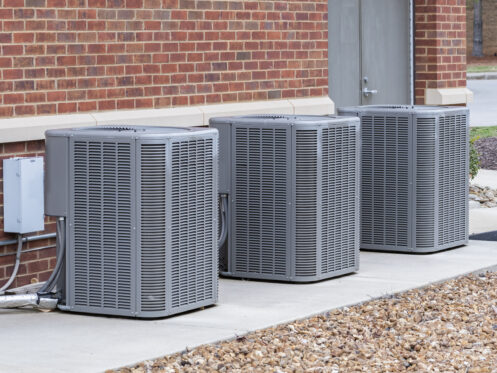The average lifespan of modern air conditioners is about 15 to 20 years. Depending upon its age, condition, and remaining efficiency, the AC in your Norman, OK home might not be worth repairing. Whether your air conditioner’s compressor has failed or your home energy bills are growing out of control, it’s essential to know when to replace your cooling equipment. The following are eight signs that you’ll be better off with a brand-new AC.
1. Age
Like other HVAC equipment types, air conditioners gradually lose efficiency as they grow older. They take longer to cool homes down, and they use more energy in the process. You might notice a progressive rise in your cooling costs paired with rapidly declining performance. Older ACs have a hard time regulating humidity and performing on days with high cooling demand. They have a higher likelihood of short cycling, overheating, and exhibiting other signs of age-related distress.
Some HVAC experts estimate that many air conditioners lose as much as half of their efficiency after just 10 years. Many older ACs have multiple worn components, loose connections, and aging motors. Over time, you’ll likely find that keeping your old AC is more costly than having it swapped out.
2. Improper Sizing
To ensure accurate AC sizing, most HVAC companies use the Manual J Load Calculation. This calculation considers numerous household and building-specific factors. It’s so complex that the most accurate determinations are made using special software. By accounting for things like ceiling heights, square footage, building layouts, and household sizes, HVAC professionals ensure that homeowners aren’t getting ACs that are under or oversized.
Air conditioners that are too small for their service areas run nearly non-stop. Even with longer-than-normal cooling cycles, they’re rarely able to create and maintain the indoor conditions that consumers want. When air conditioners are too large, they cycle on and rapidly cycle back off. Both problems cause inefficient performance and significant AC stress. They also lead to lower equipment lifespans.
While most homeowners notice sizing issues immediately after their new air conditioners are installed, sometimes sizing issues develop over time. Although referred to as AC “sizing,” sizing really measures an air conditioner’s cooling capacity. Whenever factors considered within the Manual J Load Calculation change, cooling needs change as well.
You might need a larger or smaller AC if you’ve recently renovated your home, replaced your windows, added insulation, or increased or decreased your family size. Although it takes major household or building changes to alter home cooling needs significantly, ongoing changes can have a cumulative impact as the years go by.
If your air conditioner is no longer capable of meeting your cooling needs, paying for repairs for an older unit may not make sense. It’s better to consult with a seasoned HVAC technician to get a needs-specific recommendation.
3. Potential Health and Safety Issues
Unlike fuel-combusting furnaces, aging air conditioners don’t pose the risk of carbon monoxide exposure or natural gas leaks. However, fixing an old air conditioner that’s poised for failure could lead to a home cooling emergency.
With summertime temperatures ranging into the mid-90s and often hitting triple digits, your household can’t afford to be without a high-functioning cooling system. If you paid for significant repairs in the prior cooling season and your air conditioner requires additional work to make it through this summer, there’s a good chance it will break down right when you need it most.
4. Substantial, Cumulative Repair Costs
If you can, add up all of your AC repair costs for the past five years. You might find that these charges already exceed the cost of new equipment. Since air conditioners often develop increasingly frequent problems as they age, paying for replacement now could be the most cost-effective choice.
5. Refrigerant Supply Issues
Residential AC refrigerants have seen quite an evolution over the past decade. Many years ago, all residential ACs had Freon or R-22 as their coolant. However, this refrigerant was phased out starting in the early ’90s. The last Freon-reliant AC hit the scene in 2009, and all domestic Freon production and importation ceased in 2020.
Needless to say, if you’re still using an AC with Freon, you could wind up paying a fortune for recharge service. You’ll also notice that there are far fewer HVAC companies and technicians that are qualified to handle R-22. If your Freon-reliant air conditioner has a refrigerant leak, replacement is undoubtedly the best choice.
Freon was replaced by Puron or R-401a. Puron doesn’t contain the ozone-damaging hydrochlorofluorocarbons (HCFCs) that gave Freon a bad name. However, it does contain hydrofluorocarbons (HFCs) that still take an environmental toll. This is why AC manufacturers are now using eco-friendly options like R-454b. Although a Puron-reliant AC is hardly outdated, whether or not you’ll be able to easily access this refrigerant in the coming years is worth considering when deciding between replacement and repairs.
6. Problems With Indoor Air Quality, Odors, and Excessive Noise
Old, poor-performing air conditioners are a nuisance. Most units become increasingly loud as time goes on. You can hear them when they rumble into action, when they cycle down, and all throughout their cooling cycles. You might contend with annoying humming or rattling sounds, banging, clanging, or whistling. While some noises are an indication of fixable problems, others are due to the general ravages of time.
Choosing replacement over repairs may be a good idea if you’re tired of struggling to hear the TV, hold quiet conversations, or simply enjoy a little peace while your AC is running. Not only will new cooling equipment offer whisper-quiet operation, but it will also boost your indoor air quality and eliminate persistent AC odors.
7. AC Compressor Failure
Most air conditioners come with limited parts warranties that last 12 to 15 years and compressor warranties that last five to 10 years or longer. These warranties cover all problems resulting from defective parts or poor assembly. When they expire, even these issues must be paid for out-of-pocket.
Your air conditioner’s compressor is its most expensive component. It makes good sense to replace a broken compressor if the work is covered by warranty and everything else is still working as it should. However, if your compressor’s warranty protections have ended and your AC has already experienced an age-related decline in performance, it’s time for new cooling equipment. The good news is that our Signature Series systems come with Lifetime Warranties. You will never have to worry about your Heating or Air Conditioning again!
8. You’re Selling Your Home
If you haven’t replaced your air conditioner in more than 15 years, you’re missing out on many recent innovations. You can choose from options with dual-speed motors, variable-speed motors, and smart capabilities.
You can also find options with sensor-driven ventilation, protective features, and more. Upgrading your cooling equipment before listing your home will bring it current with market standards. A new AC will increase your home’s marketability and raise its resale value.
Contact the Professionals
At Norman Air, we have proudly served the residents of Norman, OK since 2008. We offer exceptional furnace, heat pump, and AC installation, maintenance, and repair services. We also provide top-notch plumbing and electrical services. To schedule an appointment with one of our expert technicians, get in touch with us today.

